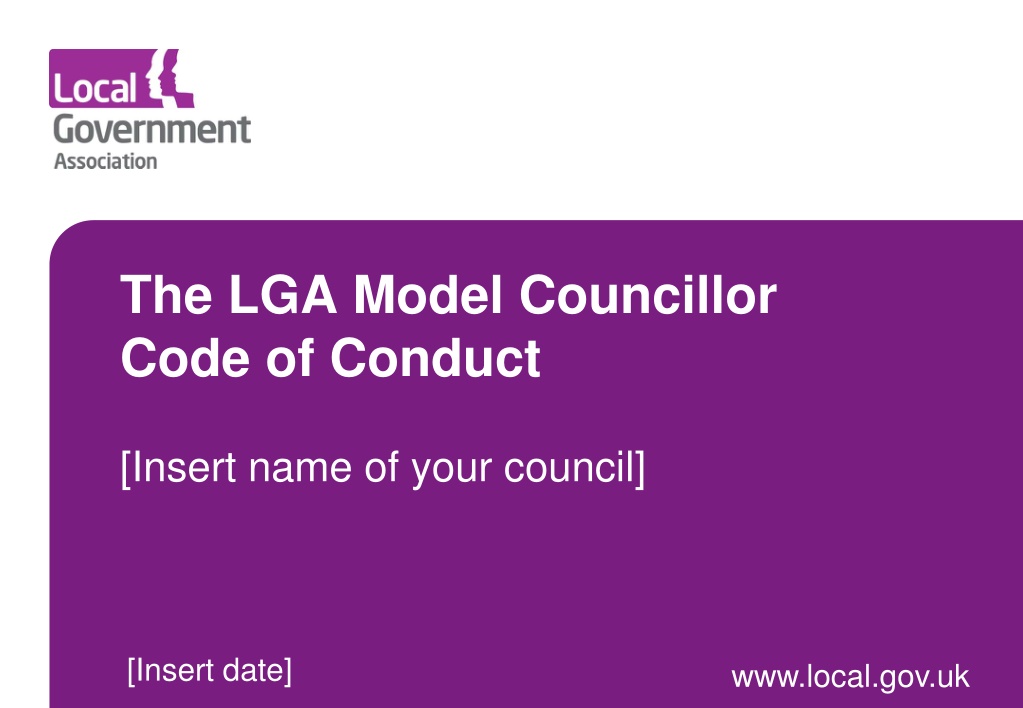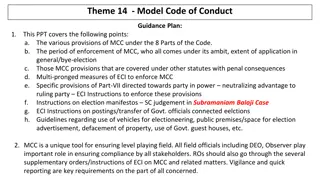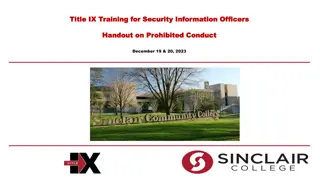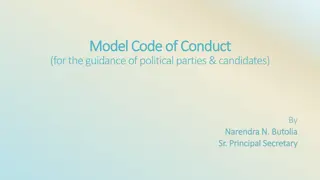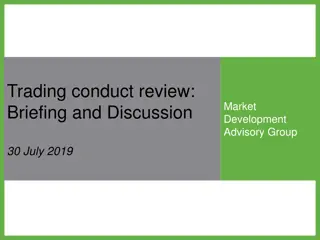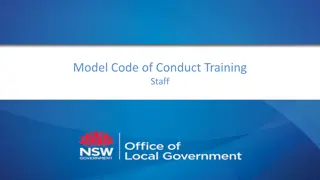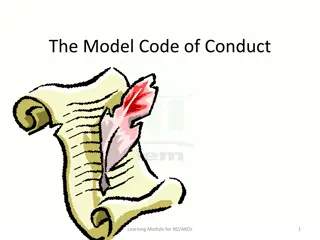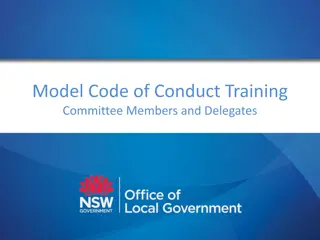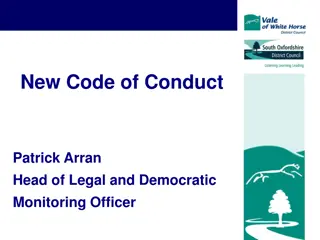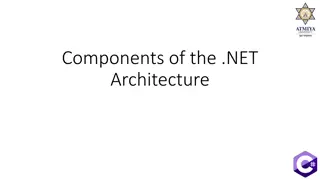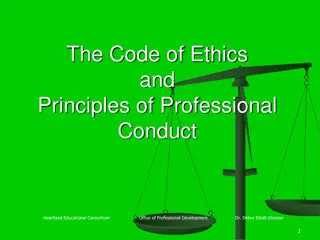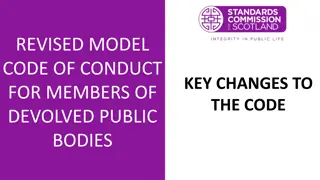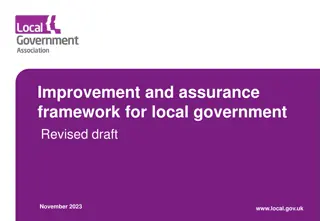Understanding the LGA Model Councillor Code of Conduct
Explore the provisions of the LGA Model Councillor Code of Conduct, emphasizing the importance of standards in public life, behavioral requirements for councillors, and issues like bias and predetermination. The training aims to equip councillors with a thorough understanding of the code for effective and lawful role fulfillment.
Download Presentation

Please find below an Image/Link to download the presentation.
The content on the website is provided AS IS for your information and personal use only. It may not be sold, licensed, or shared on other websites without obtaining consent from the author. Download presentation by click this link. If you encounter any issues during the download, it is possible that the publisher has removed the file from their server.
E N D
Presentation Transcript
The LGA Model Councillor Code of Conduct [Insert name of your council] [Insert date] www.local.gov.uk
Purpose of this training reflect on the importance of standards in public life outline the provisions of the local authority s Councillor Code of Conduct look at the requirements of behaviour and conduct for councillors explore interests, bias and predetermination. www.local.gov.uk
Overall aim of this training that all councillors gain an excellent understanding of the provisions of the code and feel immediately better equipped to carry out their roles effectively and lawfully www.local.gov.uk
Preparation of this training material The Local Government Association (LGA) has prepared this presentation for use by any council to support the introduction and implementation of codes of conduct based on the LGA Model Councillor Code of Conduct. [The material has been changed to reflect our council s Councillor Code of Conduct and our circumstances in the sections relating to .] www.local.gov.uk
The importance of standards in public life Local government impacts the lives of citizens every day, providing essential services to those it serves. Its decisions directly affect the quality of life of local people. High standards of conduct in local government are needed to demonstrate that those decisions are taken in the public interest and to maintain public confidence The Committee on Standards in Public Life www.local.gov.uk
Introduction and welcome Lord Evans of Weardale, Chair of the Committee on Standards in Public Life Watch on YouTube www.local.gov.uk
What are the main challenges for you as a councillor in ensuring high standards of conduct? www.local.gov.uk
The LGA Model Councillor Code of Conduct The Committee on Standards in Public Life recommended the introduction of an updated model councillor code of conduct in January 2019. The LGA Model Councillor Code of Conduct was introduced in December 2020 following extensive consultation. Guidance was issued in July 2021. www.local.gov.uk
Purpose of the code to assist councillors in modelling the expected behaviour to provide a personal check and balance to set out the type of conduct that could lead to action being taken against you also, to protect you, the public, your fellow councillors, officers and the reputation of local government www.local.gov.uk
General principles of councillor conduct
Principles Everyone in public office at all levels who serves the public or delivers public services should uphold the Seven Principles of Public Life , also known as the Nolan Principles . The LGA Model Councillor Code of Conduct also includes general principles which were developed specifically for the role of councillor. www.local.gov.uk
The Nolan Principles selflessness integrity objectivity accountability openness honesty leadership www.local.gov.uk
General principles (all occasions) I act with integrity and honesty. I act lawfully. I treat all persons fairly and with respect. I lead by example and act in a way that secures public confidence in the role of councillor. www.local.gov.uk
General principles when undertaking your role I impartially exercise my responsibilities in the interests of the local community. I do not improperly seek to confer an advantage or disadvantage on any person. I avoid conflicts of interest. I exercise reasonable care and diligence. I ensure that public resources are used prudently in accordance with the local authority s requirements and in the public interest. www.local.gov.uk
Application of your Councillor Code of Conduct
Your Councillor Code of Conduct applies when you are acting in your capacity as a councillor which may include when: you misuse your position as a councillor your actions would give the impression to a reasonable member of the public with knowledge of all the facts, that you are acting as a councillor. www.local.gov.uk
Your Councillor Code of Conduct applies to face-to-face meetings online or telephone meetings written communication verbal communication non-verbal communication electronic and social media communication, posts, statements and comments. www.local.gov.uk
You are expected to uphold high standards of conduct and show leadership at all times when acting as a councillor www.local.gov.uk
Applications of the model code examples an argument with your neighbour private a councillor and an officer having a personal relationship covered by the code writing on council notepaper or using council email, using councillor business cards or wearing council regalia covered by the code an argument with a taxi driver and a threat to their licence covered by the code. www.local.gov.uk
Social media is now explicitly covered by the LGA Model Councillor Code of Conduct can be the main source of Code of Conduct complaints in many local authorities is covered in guidance available from the Local Government Association. www.local.gov.uk
Social media examples Calling yourself a councillor (or not doing so) is not conclusive. There must be a link within the posting or thread to your role as a councillor or to local authority business. Councillor posted on Facebook (as a member of the public) that an officer should be sacked covered by the code. Councillor made insulting remarks about the Prime Minister not covered by the code. www.local.gov.uk
General obligations under the model Code of Conduct
Which generates most complaints? treating others with respect not bullying, harassing or discriminating not compromising the impartiality of officers dealing properly with information not bringing the council or your office into disrepute improper use of your position improper use of resources cooperating with code of conduct issues registering and disclosing interests dealing properly with gifts and hospitality www.local.gov.uk
Standards of councillor conduct 1 I treat other councillors and members of the public with respect. I treat local authority employees, employees and representatives of partner organisations and volunteers with respect and respect the role they play. www.local.gov.uk
Respect examples Highly critical comment and offensive caption posted about a councillor who had recently died disrespect (and disrepute). Comments on a blog about nepotism in the award of contracts disrespect (and disrepute). Councillor made abusive insulting and personal remarks to a police officer in their capacity as a ward member disrespect. www.local.gov.uk
Standards of councillor conduct 2 I do not bully any person. I do not harass any person. I promote equalities and do not discriminate against any person. www.local.gov.uk
Bullying and harassment examples Isolated minor incident unlikely to be bullying, but cumulative minor incidents can be. Did the councillor know their actions constitute harassment, would a reasonable person consider the actions to be harassment and what was the impact on the victim? At an official event, a councillor made unwarranted and inappropriate physical contact with councillors and officers and made patronising and demeaning comments this was a breach of the code. www.local.gov.uk
Equalities and discrimination examples Councillor 'liked' racially discriminatory comments on social media advocating violence against travellers a breach of the code. Councillor made a derogatory racist comment about a candidate for a job a breach of the code. www.local.gov.uk
Standards of councillor conduct 3 I do not compromise, or attempt to compromise, the impartiality of anyone who works for, or on behalf of, the local authority. www.local.gov.uk
Impartiality examples Councillor became involved in a social care case and inappropriately sought to influence operational decision-making. He sent discourteous correspondence to officers. Councillor sought to influence the decision of council officers dealing with a complaint by his son and daughter-in-law against a tenant. Both were breaches of the code. www.local.gov.uk
Standards of councillor conduct 4 I do not disclose confidential information unless: I have the required consent I am required to do so by law I need professional third-party advice the disclosure is reasonable, in the public interest, in good faith, complies with the local authority s requirements and there has been consultation with the monitoring officer. I do not improperly use knowledge gained as a result of my role. I do not prevent lawful access to information. www.local.gov.uk
Information examples Councillor was involved in an adoption case and inadvertently shared information about the matter with a relative of the constituent a breach of the code. Councillor circulated information about the medical condition of an officer without consent a breach of the code. www.local.gov.uk
Standards of councillor conduct 5 I do not bring my role or my local authority into disrepute. www.local.gov.uk
Disrepute examples Councillor posted an offensive tweet about another councillor referring to the Serious Fraud Office (SFO) investigating her conduct this brought the local authority into disrepute. Councillor took advantage of a mistake and failed to prevent local authority employed contractors working on his (privately owned) home this brought the local authority into disrepute. Chair of a council made a deeply inappropriate remark at a meeting. Many other councillors expressed concerns and found the remarks inappropriate this brought his office (but not the local authority) into disrepute. www.local.gov.uk
Standards of councillor conduct 6 I do not use, or attempt to use, my position improperly to the advantage or disadvantage of myself or anyone else. www.local.gov.uk
Use of position examples Councillor discussed and voted on a new lease to a community group without revealing that she was the joint coordinator of the group this was using her position improperly. Leader failed to declare a conflict of interest and used his position to enhance the value of his own land (by instructing a planning officer about the route of a bypass) a breach of the model Code (and an 18-month prison sentence). www.local.gov.uk
Standards of councillor conduct 7 I do not misuse local authority resources. I will use them in accordance with the local authority s requirements and will not use them for political purposes (unless that use could reasonably be regarded as likely to facilitate, or be conducive to, the discharge of the functions of the local authority or my office). www.local.gov.uk
Council resources examples Councillor used council computer equipment for private purposes by downloading pornographic images this was a misuse of resources (and, also, disrepute). Councillor used council notepaper in an attempt to avoid parking penalties incurred by his son this was a breach of the model Code (and a conviction for deception). www.local.gov.uk
Standards of councillor conduct 8 I undertake standards training. I cooperate with any standards investigation and/or determination. I do not intimidate / attempt to intimidate any person who is likely to be involved with the administration of an investigation or proceedings. I comply with any sanction imposed on me following a breach finding. www.local.gov.uk
Protecting your reputation and the reputation of your local authority
Standards of councillor conduct 9 I register and disclose my interests. www.local.gov.uk
Standards of councillor conduct 10 I do not accept gifts and hospitality, irrespective of value, which could give rise to gain or concern. I register any gift or hospitality of 50 or more with the monitoring officer within 28 days. I register with the monitoring officer any significant gift or hospitality I have been offered but rejected. www.local.gov.uk
Registration and disclosure of interests
Which aspects of registering or disclosing interests do you find most challenging? www.local.gov.uk
Interests Three types of interests: disclosable pecuniary interests (DPIs) other registerable interests (ORIs) non-registerable interests (NRIs). Two types of situations: registration disclosure. www.local.gov.uk
Disclosable pecuniary interests (DPIs) 1 DPIs relate to things such as your employment, interests in land, contracts with the council, and so on (table 1). They cover interests of you and of your spouse / partner. You must register them within 28 days of election and whenever your position changes. www.local.gov.uk
Disclosable pecuniary interests (DPIs) 2 It is a criminal offence under the Localism Act (2011) to fail to register DPIs, to fail to disclose them at meetings, to participate or vote where you have a DPI or to provide false or misleading information about them. Where a matter arises at a meeting which directly relates to a DPI, you must disclose it, not participate in any discussion or vote on the matter and not remain in the room (unless you have a dispensation). www.local.gov.uk
Disclosable pecuniary interests (DPIs) guidance and examples 1 You have a DPI where the matter being discussed directly relates to your registered interest rather than just affecting it. If you live at 1 Acacia Avenue, you will have a DPI if you apply for planning permission for 1 Acacia Avenue or if the whole of Acacia Avenue is being considered for a Residents Parking Zone. You will not have a DPI if 3 Acacia Avenue has put in a planning application (though you may have an NRI). www.local.gov.uk
Disclosable pecuniary interests (DPIs) guidance and examples 2 awarding a contract to your own company planning application for your own property Resident Parking Zone includes your house all these are DPIs, so you should disclose them and withdraw (unless you have a dispensation) criminal offence if you fail to do so Section 34 of the Localism Act (2011). www.local.gov.uk
Other registerable interests (ORIs) 1 ORIs relate to unpaid directorships, membership of outside bodies, charities, lobby groups, trade unions, political parties, and so on (table 2). Must register them within 28 days of election / appointment to office and whenever your position changes. www.local.gov.uk
